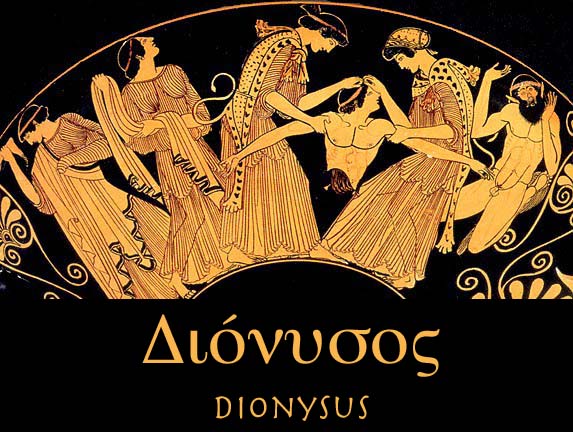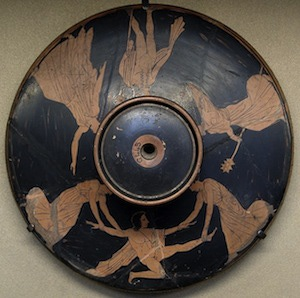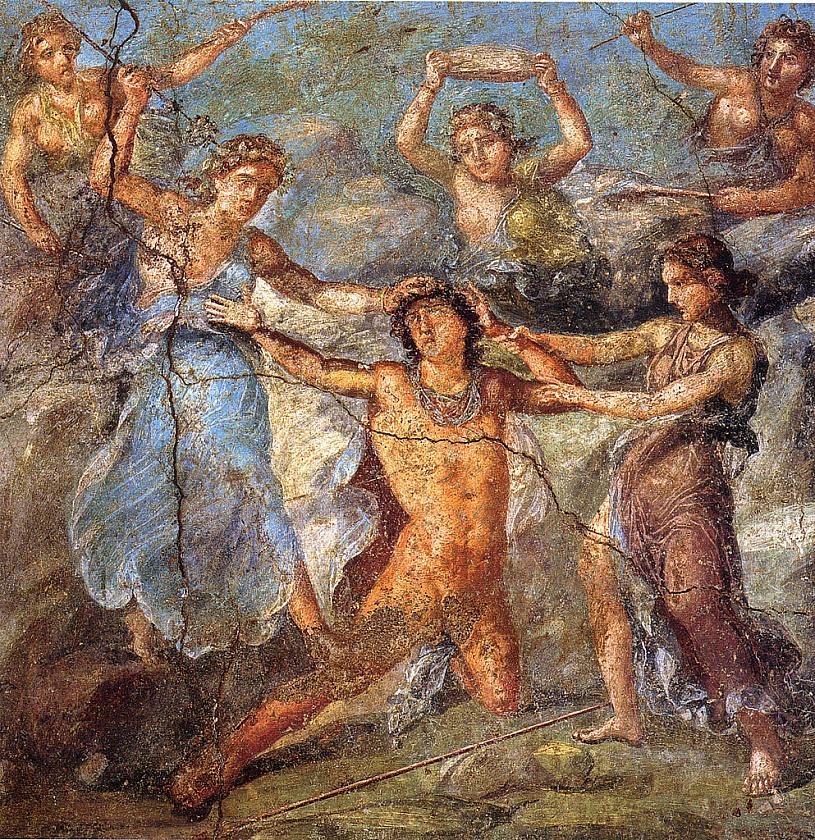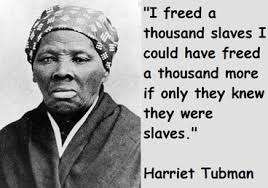It looks like you're using an Ad Blocker.
Please white-list or disable AboveTopSecret.com in your ad-blocking tool.
Thank you.
Some features of ATS will be disabled while you continue to use an ad-blocker.
share:
I wish, before I die, to see the patriarchy. If only someone could produce it for me, I might be able to finally cash in on my entitlement and
privilege. Show it to me. Put it in my hands. Or maybe, I'll put it in yours.
The feminist idea of a patriarchy—the idea that the authority, both moral and institutional, is male-centric, male-dominated—is basically a commonplace idea throughout society nowadays. This male-dominated “system” implies the subordination of women in favour of the privilege and entitlement of men, not only in the structure of the family, but also in the very culture families build themselves within.
I would tend to agree that most positions of power, and most positions of cultural and moral authority, have been held by men. Historically, these positions of power seem to be, for the most part, populated by males, with women making fewer contributions in the areas of statecraft, politics, literature, art, industry, religion and invention. It is not quite apparent whether the assertion of a patriarchy is instead a subtle admission to a lack of contribution towards culture and society by women on the part of feminism, but with such a vast difference in sheer output of contributions to these areas, it is safe to say that these areas were not only populated by men, but indeed, shaped and formed by them. That is, of course, not to speak little of the contributions women have made to the patriarchy when they were in power—to religion, to reform, to philosophy, to science, to exploration, to imperialism—a group of female misogynists the feminists are silent about.
Have men really shaped society to favour them? I find it somewhat strange that 50% of a human population is responsible for 100% of its culture. How this is logically possible when 100% of a culture represents 100% of its population is quite unclear, but perhaps it can be followed with simple black and white logic. If 100% of a culture favours only 50% of itself, we might begin to wonder what the other 50% has been doing. In order to believe this, we can only assume that 50% of the population is endowed with volition, creativity, reason, power and the will to use it, while the other half is, well, mindless automatons or submissive slaves who favour the other 50% simply because they are told to. For the sake of argument, we will conclude that the less favoured half of the population were submissive slaves, who have always lived under the black boot of their oppressive masters, the other 50%. If the oppressive gender has always held positions of power, and the other gender, positions of submission, we must note that every incremental advancement of the subjugated gender towards “equality” has either been given by, or taken from, the oppressive gender. And if the culture was both created by, built by and enforced by the oppressive gender, then it would follow that any acquisition of positions of power in these areas would be made at a loss to that gender, with a gain to the other. Following this, if one gender is both governor and the sole contributor to 100% of culture and its advancement, this must also include the cultural advancements of the other gender. In other words, every advancement of women has been made by men. Every feminist advance towards “equality” was built within and upon patriarchal structures and patriarchal principles. Irony? And this only puts a subtle paradox into new light: How could a society invented by, built by, or enforced by one half, reorientate itself to favour the half who had nothing to do with its construction? Further, if men have always invented, built and enforced society, then doesn’t that imply women are merely a guest here? What kind of guest seeks to trade places with the host?
But this doesn’t work in reality. Only 100% of a population can be responsible for 100% of the culture; meaning, every culture represents 100% of the individuals that make it up. If a sub-section of a population becomes marginalized, and another sub-section becomes a majority—which comes with political power, institutional control and higher influence on culture—that is simply the present culture in all its chaotic glory, every party to blame. Can it be changed? You damn rights—. But it isn’t until the oppressed stand up and take their rights by force, convince the oppressors to compromise in some fashion, or at least chip away at the foundations that this might occur. This can be seen historically, as women got their right to vote, blacks won their freedom from slavery, and the proletariates seized power through their revolutions, and so on. Society is no ironclad structure of laws, power positions, speech communities, and governments; society is the acting out of a system by its population, all of it, not just half. Society is an effect, not a cause. In short, society is written by everyone. If history only ever seems written by those in power, it was because those who weren’t in power never bothered to pick up the pen.
Of course, as we know, this isn’t entirely true, and women have held positions of power throughout all the ages, and have made plenty of contributions towards social, political and cultural change to human populations. How this is possible in a society totally geared to the male gender is unclear, and we are perhaps supposed to assume that these women must have been somewhat of a manly nature in order to take these masculine positions, or that they were forced by men against their will. If not, then these women got there on their own accord, but I wouldn’t put it past those idiotic men who, in their quest to devise male-centric institutions, stupidly left a sort of loophole within the patriarchy that allowed women direct back-door access to their positions of power and control. Either way, another paradox emerges and is embodied in physical form: a female authority in a patriarchal system. How is this possible? Only answer: anything is.
A simple look at men and women we find that we are not equal. We have different parts. And the constitutions already specify equal rights to all individuals regardless of gender. So what do feminists really want? What implicit ideology lies beneath the lie “we want equality”, and “death to patriarchy”? What rights do men have left to give them, or rather, build for them? They want what every ideology wants: to assert itself in the public square, to seize power—if not in the political arena, at least in parasitic form within the minds who come across it. To a privileged entitled soul such as my self at least, it sounds like a lust for power, position, money and security. Indeed, if men aren’t going to hold positions of power any longer, guess who the feminists have in mind for a substitute. Preaching equality while at the same time denouncing white male privilege, which to any anti-sexist and anti-racist is a completely sexist and racist assumption, gives irony a bad name. Instead, equality for them has become a seduction, a means of convincing others with a romantic idea so as to make equal two unequal things; and this is not pushed by any sort of logical or reasonable argument, but through shame tactics, propaganda, slander and outright dishonesty. Underneath the costume, underneath the faceless bogeyman known as “patriarchy”, ideologists pushing an agenda—Patriarchy as a means to matriarchy.
Thank you for reading.
LesMis
The feminist idea of a patriarchy—the idea that the authority, both moral and institutional, is male-centric, male-dominated—is basically a commonplace idea throughout society nowadays. This male-dominated “system” implies the subordination of women in favour of the privilege and entitlement of men, not only in the structure of the family, but also in the very culture families build themselves within.
I would tend to agree that most positions of power, and most positions of cultural and moral authority, have been held by men. Historically, these positions of power seem to be, for the most part, populated by males, with women making fewer contributions in the areas of statecraft, politics, literature, art, industry, religion and invention. It is not quite apparent whether the assertion of a patriarchy is instead a subtle admission to a lack of contribution towards culture and society by women on the part of feminism, but with such a vast difference in sheer output of contributions to these areas, it is safe to say that these areas were not only populated by men, but indeed, shaped and formed by them. That is, of course, not to speak little of the contributions women have made to the patriarchy when they were in power—to religion, to reform, to philosophy, to science, to exploration, to imperialism—a group of female misogynists the feminists are silent about.
Have men really shaped society to favour them? I find it somewhat strange that 50% of a human population is responsible for 100% of its culture. How this is logically possible when 100% of a culture represents 100% of its population is quite unclear, but perhaps it can be followed with simple black and white logic. If 100% of a culture favours only 50% of itself, we might begin to wonder what the other 50% has been doing. In order to believe this, we can only assume that 50% of the population is endowed with volition, creativity, reason, power and the will to use it, while the other half is, well, mindless automatons or submissive slaves who favour the other 50% simply because they are told to. For the sake of argument, we will conclude that the less favoured half of the population were submissive slaves, who have always lived under the black boot of their oppressive masters, the other 50%. If the oppressive gender has always held positions of power, and the other gender, positions of submission, we must note that every incremental advancement of the subjugated gender towards “equality” has either been given by, or taken from, the oppressive gender. And if the culture was both created by, built by and enforced by the oppressive gender, then it would follow that any acquisition of positions of power in these areas would be made at a loss to that gender, with a gain to the other. Following this, if one gender is both governor and the sole contributor to 100% of culture and its advancement, this must also include the cultural advancements of the other gender. In other words, every advancement of women has been made by men. Every feminist advance towards “equality” was built within and upon patriarchal structures and patriarchal principles. Irony? And this only puts a subtle paradox into new light: How could a society invented by, built by, or enforced by one half, reorientate itself to favour the half who had nothing to do with its construction? Further, if men have always invented, built and enforced society, then doesn’t that imply women are merely a guest here? What kind of guest seeks to trade places with the host?
But this doesn’t work in reality. Only 100% of a population can be responsible for 100% of the culture; meaning, every culture represents 100% of the individuals that make it up. If a sub-section of a population becomes marginalized, and another sub-section becomes a majority—which comes with political power, institutional control and higher influence on culture—that is simply the present culture in all its chaotic glory, every party to blame. Can it be changed? You damn rights—. But it isn’t until the oppressed stand up and take their rights by force, convince the oppressors to compromise in some fashion, or at least chip away at the foundations that this might occur. This can be seen historically, as women got their right to vote, blacks won their freedom from slavery, and the proletariates seized power through their revolutions, and so on. Society is no ironclad structure of laws, power positions, speech communities, and governments; society is the acting out of a system by its population, all of it, not just half. Society is an effect, not a cause. In short, society is written by everyone. If history only ever seems written by those in power, it was because those who weren’t in power never bothered to pick up the pen.
Of course, as we know, this isn’t entirely true, and women have held positions of power throughout all the ages, and have made plenty of contributions towards social, political and cultural change to human populations. How this is possible in a society totally geared to the male gender is unclear, and we are perhaps supposed to assume that these women must have been somewhat of a manly nature in order to take these masculine positions, or that they were forced by men against their will. If not, then these women got there on their own accord, but I wouldn’t put it past those idiotic men who, in their quest to devise male-centric institutions, stupidly left a sort of loophole within the patriarchy that allowed women direct back-door access to their positions of power and control. Either way, another paradox emerges and is embodied in physical form: a female authority in a patriarchal system. How is this possible? Only answer: anything is.
A simple look at men and women we find that we are not equal. We have different parts. And the constitutions already specify equal rights to all individuals regardless of gender. So what do feminists really want? What implicit ideology lies beneath the lie “we want equality”, and “death to patriarchy”? What rights do men have left to give them, or rather, build for them? They want what every ideology wants: to assert itself in the public square, to seize power—if not in the political arena, at least in parasitic form within the minds who come across it. To a privileged entitled soul such as my self at least, it sounds like a lust for power, position, money and security. Indeed, if men aren’t going to hold positions of power any longer, guess who the feminists have in mind for a substitute. Preaching equality while at the same time denouncing white male privilege, which to any anti-sexist and anti-racist is a completely sexist and racist assumption, gives irony a bad name. Instead, equality for them has become a seduction, a means of convincing others with a romantic idea so as to make equal two unequal things; and this is not pushed by any sort of logical or reasonable argument, but through shame tactics, propaganda, slander and outright dishonesty. Underneath the costume, underneath the faceless bogeyman known as “patriarchy”, ideologists pushing an agenda—Patriarchy as a means to matriarchy.
Thank you for reading.
LesMis
edit on 18-7-2014 by LesMisanthrope because: (no reason given)
a reply to: LesMisanthrope
Interesting post. First, let me tell you a thing or two about patriarchy, then about feminism.
Currently, over 1 billion people in this world are Muslim. They control governments at this point from West Africa to East Asia, with talk currently of expanding into Europe, China, Russia, and ultimately the US, and imposing Sharia law. Women under sharia law are absolutely under men. Its absolute patriarchy.
Now, let me tell you about feminists. All through history, men have played a role of being the workers, while women often stayed home and raised the kids. That really an issue of bodies - men's bodies are more suited the physical labor of yore, while raising kids was also a full time job best suited to women. But early in the 20th century, an idea called IQ was developed, and an interesting thing was discovered: The IQs of men and women were equal. That means that in an economy of thought, rather than an economy of physical labor, women had the ability to contribute just as much as men. Capitalist leaders welcomed women into the workforce, and the 20th century happened. At least in America, Europe, Russia, China, and Latin America, amongst others. Radical Islamists still stood against this progress in the middle east.
To this day, this question about the role of women, still stands as a major dividing point between western secular and Islamist (sharia) cultures, so there is a currently a culture war going on. The question is, which side are you on?
Interesting post. First, let me tell you a thing or two about patriarchy, then about feminism.
Currently, over 1 billion people in this world are Muslim. They control governments at this point from West Africa to East Asia, with talk currently of expanding into Europe, China, Russia, and ultimately the US, and imposing Sharia law. Women under sharia law are absolutely under men. Its absolute patriarchy.
Now, let me tell you about feminists. All through history, men have played a role of being the workers, while women often stayed home and raised the kids. That really an issue of bodies - men's bodies are more suited the physical labor of yore, while raising kids was also a full time job best suited to women. But early in the 20th century, an idea called IQ was developed, and an interesting thing was discovered: The IQs of men and women were equal. That means that in an economy of thought, rather than an economy of physical labor, women had the ability to contribute just as much as men. Capitalist leaders welcomed women into the workforce, and the 20th century happened. At least in America, Europe, Russia, China, and Latin America, amongst others. Radical Islamists still stood against this progress in the middle east.
To this day, this question about the role of women, still stands as a major dividing point between western secular and Islamist (sharia) cultures, so there is a currently a culture war going on. The question is, which side are you on?
edit on 18-7-2014 by tridentblue because: (no reason given)
Clothing this stupidity in the robes of logic still doesn't take away the fact it's stupid.
I actually found no opinion in the OP, it seems as if it was the definition of patriarchy lifted straight from Wikipedia.
Having read the OP three times I am still confused as to what the point is that the OP is trying to begin a discussion about?
Perhaps you could state your question in one or two sentences so we may respond.
Having read the OP three times I am still confused as to what the point is that the OP is trying to begin a discussion about?
Perhaps you could state your question in one or two sentences so we may respond.
a reply to: Senators
I’d love to hear your definition of a patriarchy if you wouldn’t mind.
Here’s the question: What patriarchy? I mean it’s right in the title.
I actually found no opinion in the OP, it seems as if it was the definition of patriarchy lifted straight from Wikipedia.
Having read the OP three times I am still confused as to what the point is that the OP is trying to begin a discussion about?
Perhaps you could state your question in one or two sentences so we may respond.
I’d love to hear your definition of a patriarchy if you wouldn’t mind.
Here’s the question: What patriarchy? I mean it’s right in the title.
a reply to: tridentblue
Have you been to any Islamist country? Unfortunately, women have just as much to do with the culture as men. If women seem to be subjugated, forced to wear a hijab, it is not because they are mindless oppressed slaves who have no choice, it is because they believe the principals of their religion. Women are also radical Islamists. Perhaps we should send the feminists there right away.
Currently, over 1 billion people in this world are Muslim. They control governments at this point from West Africa to East Asia, with talk currently of expanding into Europe, China, Russia, and ultimately the US, and imposing Sharia law. Women under sharia law are absolutely under men. Its absolute patriarchy.
Have you been to any Islamist country? Unfortunately, women have just as much to do with the culture as men. If women seem to be subjugated, forced to wear a hijab, it is not because they are mindless oppressed slaves who have no choice, it is because they believe the principals of their religion. Women are also radical Islamists. Perhaps we should send the feminists there right away.
The following quote is from timestop 17:00
Patriarchy theory was the tasty tasty rationalization most of society gobbled up to explain the overt hostility of second wave feminists toward males. And feminisms ever increasing advancement of women's interests at the expense of everybody else.

In my opinion there is a huge male bashing psy-op that has been seeded into the subconscious over the past forty years. We are just beginning to see open and naked displays of it, but this is nothing compared to what is coming. In the propagandists attempts to meddle with western society, weather for political or commercial reasons, has been meddling with forces they do not really understand.

My analysis indicates a world wide media driven catastrophe in our futures. The world wide sparagmos of men by 10% of the female population. Overnight, in one brief flair up of hysteria and irrationality. Spreading contagious waves of angry rioting and looting women. Tearing any man found apart with their bare hands. Where in the morning all that can be said is "oops," and it will be found that nobody is left alive.
Mike Grouchy

edit on 21-7-2014 by mikegrouchy because: format
Personally, what I hear when one refers to the "patrarchy" is the form of values and power which are of masculine nature.
Meaning- primarily, values upon individualism and capitalism. Socialism and communism, I consider to be "matriarchial" systems.
It is natural that more males will take important roles in a system which turns upon the masculine values- the majority of men instinctually understand and have strengths in those areas. So even if the women within that system integrate and are loyal to the values, they will have more difficulties within it.
The reverse, I think, is true for the males within a matriarchial sort of system- in which individual difference and competition is de-valued in exchange for group solidarity and conformism. Even the men who grow up in that system and are loyal to those values might find their natural instincts to be a cause of more difficulty for them within it.
One could say- but even within such societies, there are not a lot of well known women!
That is exactly the nature of matriarchy- a de-valuation on personal glory and individual power. The women may have a powerful place in their families and community, but would be very careful that not become official, or widely known. The "I" is of lesser importance than the "we".
Meaning- primarily, values upon individualism and capitalism. Socialism and communism, I consider to be "matriarchial" systems.
It is natural that more males will take important roles in a system which turns upon the masculine values- the majority of men instinctually understand and have strengths in those areas. So even if the women within that system integrate and are loyal to the values, they will have more difficulties within it.
The reverse, I think, is true for the males within a matriarchial sort of system- in which individual difference and competition is de-valued in exchange for group solidarity and conformism. Even the men who grow up in that system and are loyal to those values might find their natural instincts to be a cause of more difficulty for them within it.
One could say- but even within such societies, there are not a lot of well known women!
That is exactly the nature of matriarchy- a de-valuation on personal glory and individual power. The women may have a powerful place in their families and community, but would be very careful that not become official, or widely known. The "I" is of lesser importance than the "we".
edit on 21-7-2014 by Bluesma because: (no reason given)
The more men are vilified as an idea, the more men are abused in the individual. This has become a self perpetuating feedback loop. As men, in the
ideal, are debased the more women begin to hate men in the individual. I see no way out of the inevitable conclusion to this.
Mike Grouchy
Mike Grouchy
originally posted by: LesMisanthrope
a reply to: Senators
I actually found no opinion in the OP, it seems as if it was the definition of patriarchy lifted straight from Wikipedia.
Having read the OP three times I am still confused as to what the point is that the OP is trying to begin a discussion about?
Perhaps you could state your question in one or two sentences so we may respond.
I’d love to hear your definition of a patriarchy if you wouldn’t mind.
Here’s the question: What patriarchy? I mean it’s right in the title.
I'd love to read your personal definition of feminism, and be honest now.
www.catalyst.org...
www.regender.org...
edit on 21-7-2014 by InTheLight because: (no reason given)
edit on 21-7-2014 by InTheLight because: (no reason given)
a reply to: InTheLight
If I were to be honest, feminism is sexism, feminine chauvinism, no different than masculinism.
Would you hire a male nanny to watch your children? Be honest now.
I'd love to read your personal definition of feminism, and be honest now.
If I were to be honest, feminism is sexism, feminine chauvinism, no different than masculinism.
Would you hire a male nanny to watch your children? Be honest now.
originally posted by: LesMisanthrope
a reply to: InTheLight
I'd love to read your personal definition of feminism, and be honest now.
If I were to be honest, feminism is sexism, feminine chauvinism, no different than masculinism.
Would you hire a male nanny to watch your children? Be honest now.
So, in your mind, it has nothing whatsoever to do with equality, is that what you are saying?
a reply to: InTheLight
That is what I'm saying. Egalitarianism is something different.
So, in your mind, it has nothing whatsoever to do with equality, is that what you are saying?
That is what I'm saying. Egalitarianism is something different.
originally posted by: LesMisanthrope
a reply to: InTheLight
So, in your mind, it has nothing whatsoever to do with equality, is that what you are saying?
That is what I'm saying. Egalitarianism is something different.
Then I'll leave you to your little unrealistic thoughts.
If you have a group of right-wing commentators who claim feminists are braless lesbians who want to destroy the family, and who repeat that message for 40 years, lots of people will think that. It behooves women to stand up and say, "No." The most powerful T-shirt from the 2004 March for Women's Lives, worn by a very diverse crowd, was "This is What a Feminist Looks Like."
www.apa.org...

(post by InTheLight removed for a manners violation)
originally posted by: LesMisanthrope
That is what I'm saying. Egalitarianism is something different.
If you're working from made-up definitions of words, it's hardly worth engaging in a discussion with you. Feminism has everything to do with equality.
I could go on and illustrate the indications of the current patriarchy (which is getting better, but still exists) but I'm sure you would say that women contributed 50% to the conditions (after all we LOVE being paid less than men and being sexually assaulted and underrepresented in government and business), but I'll just ask you to google "women should" and check out the first few options for finishing the search.
a reply to: LesMisanthrope

Now before anyone cries foul. This is not off-topic. Nor am I making this a racial issue. So the example stands...
To say that women have just as much to do with their oppression in a "patriarchal" society as men do, and blame their personal beliefs, as well as their alleged lack of contributions is, in my opinion, a lack of overrall perspective. Would one say the slaves were as much to blame for their slavery as their so-called masters? One could argue it, I suppose. Considering they could have come together and rebelled against the system that labeled them as animals, and treated them as such.
But then, we'd be lacking the perspective of someone who was there. Some slaves didn't realize they were slaves. Imagine that. They were actually divided amongst themselves. Just as we are now. Sounds like social engineering was as alive and well back then, as it is now.
So where is this patriarchy? Alive and well, I'd say. Just as it has been for thousands of years. Keep the masses ignorant and divided, and you can convince them of most anything.
Feminism? A movement started and run by those who wanted to control it, and use it to create more division among the genders, as well as keep women themselves divided in opinion. Looks like they've done a great job.
Just my thoughts without writing a whole thesis.
A thought-provoking thread.

Now before anyone cries foul. This is not off-topic. Nor am I making this a racial issue. So the example stands...
To say that women have just as much to do with their oppression in a "patriarchal" society as men do, and blame their personal beliefs, as well as their alleged lack of contributions is, in my opinion, a lack of overrall perspective. Would one say the slaves were as much to blame for their slavery as their so-called masters? One could argue it, I suppose. Considering they could have come together and rebelled against the system that labeled them as animals, and treated them as such.
But then, we'd be lacking the perspective of someone who was there. Some slaves didn't realize they were slaves. Imagine that. They were actually divided amongst themselves. Just as we are now. Sounds like social engineering was as alive and well back then, as it is now.
So where is this patriarchy? Alive and well, I'd say. Just as it has been for thousands of years. Keep the masses ignorant and divided, and you can convince them of most anything.
Feminism? A movement started and run by those who wanted to control it, and use it to create more division among the genders, as well as keep women themselves divided in opinion. Looks like they've done a great job.
Just my thoughts without writing a whole thesis.
A thought-provoking thread.
edit on 7/21/2014 by Klassified because: correction

I see a picture of a celebrity with a message T-shirt was posted above.
When only one man is worth having ... in the eyes of .... what does that do to the value of the rest of men?

How many performers have actually quit touring because of fans and their uncontrollable contagious behavior in large groups.

Do participants in mob behavior really have any sense of personal responsibility.

If all men are to become so devalued, that only the one "designated" is worth having what does that do to society and the family.
Mike Grouchy
edit on 21-7-2014 by mikegrouchy because: format
new topics
top topics
-
January 6th report shows disturbing trend (nobody is shocked)
US Political Madness: 15 hours ago, 22 flags -
The Truth about Migrant Crime in Britain.
Social Issues and Civil Unrest: 17 hours ago, 11 flags -
Let's talk planes.
General Chit Chat: 14 hours ago, 5 flags -
Inexplicable military simulation - virtual reality showdown in the night..
The Gray Area: 16 hours ago, 2 flags
active topics
-
Judge rules president-elect Donald Trump must be sentenced in 'hush money' trial
US Political Madness • 38 • : network dude -
January 6th report shows disturbing trend (nobody is shocked)
US Political Madness • 59 • : network dude -
Musk calls on King Charles III to dissolve Parliament over Oldham sex grooming gangs
Mainstream News • 198 • : Oldcarpy2 -
Greatest thing you ever got, or bought?
General Chit Chat • 23 • : DAVID64 -
ILLUMINATION: Dimensions / Degrees – Da Vincis Last Supper And The Philosophers Stone
Secret Societies • 12 • : Compendium -
The Truth about Migrant Crime in Britain.
Social Issues and Civil Unrest • 13 • : TimBurr -
Stuck Farmer And His Queue Jumping Spawn
Rant • 8 • : TimBurr -
Trudeau Resigns! Breaking
Mainstream News • 68 • : MindBodySpiritComplex -
Live updates: Congress meets to certify Trump's presidential election victory
US Political Madness • 19 • : KrustyKrab -
-@TH3WH17ERABB17- -Q- ---TIME TO SHOW THE WORLD--- -Part- --44--
Dissecting Disinformation • 3953 • : 777Vader

